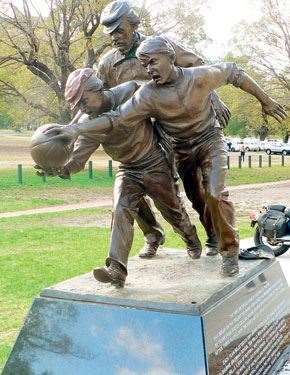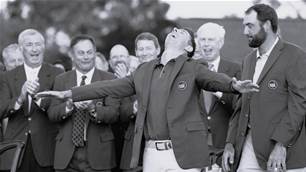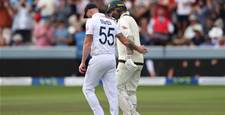A Fine Cricketer and Footballer, and the first man to write up a set of rules for our indigenous code of Football: Tom Willis is a colourful, tragic giant of Australian Sport.
 A salute to that “first” match stands at the MCG.
A salute to that “first” match stands at the MCG.Image: Getty Images
Wills had already been involved as a player in several games of the sport that later came to be known as Australian rules. Though these were informal, he attempted to set up clubs and wrote a famous letter to Bell’s Life in Victoria, a sporting publication, in an effort to gain public interest. At 23, he umpired the famous match between Scotch College and Melbourne Grammar, often considered the first formalised game ever held, at Richmond Paddock (now Yarra Park).
A year later, Wills chaired a meeting to incorporate Melbourne Football Club. The 12 rules he and his cousin (and brother-in-law), H.C.A Harrison – also an excellent sportsman – devised became the Laws of Australian Rules Football. Wills’ memory of Marn Grook most likely inspired him when he declared that “we shall have a game of our own”– one that suited the drier, harder grounds of Australia.
Melbourne Football Club became the first Australian rules club, and by sheer force of will, Wills shaped the game in its early years. He pushed for the introduction of the oval-shaped ball and was even one of the early inventors of the tactic of “flooding”, which he employed as captain/coach of Geelong against Ballarat, when he stacked his backline to prevent the stronger Ballarat from scoring.Wills was a pioneering advocate for Aboriginal sportspeople. In 1866-7, he coached an Aboriginal cricket team, many of whom became part of the first Australian team to tour England in 1868.
But his love for Aboriginal people and their culture was to haunt him. In 1861 Wills and his father, Horatio, had moved to a property in Queensland, where Horatio and 19 of his party were attacked and killed by local Indigenous people. The troubled Wills returned to Melbourne, married, and led a life of alcoholism and debt. Dogged by dreams of being attacked on his property by Aborigines, he once committed himself to the Kew Lunatic Asylum. In 1880, suffering alcoholism, Wills was admitted to Royal Melbourne Hospital, but absconded, returned to his home in Heidelberg and stabbed himself to death. He was 44.
– Robert Drane
Related Articles

Feature Story: Moving the Needle

The Aussies at The Open













